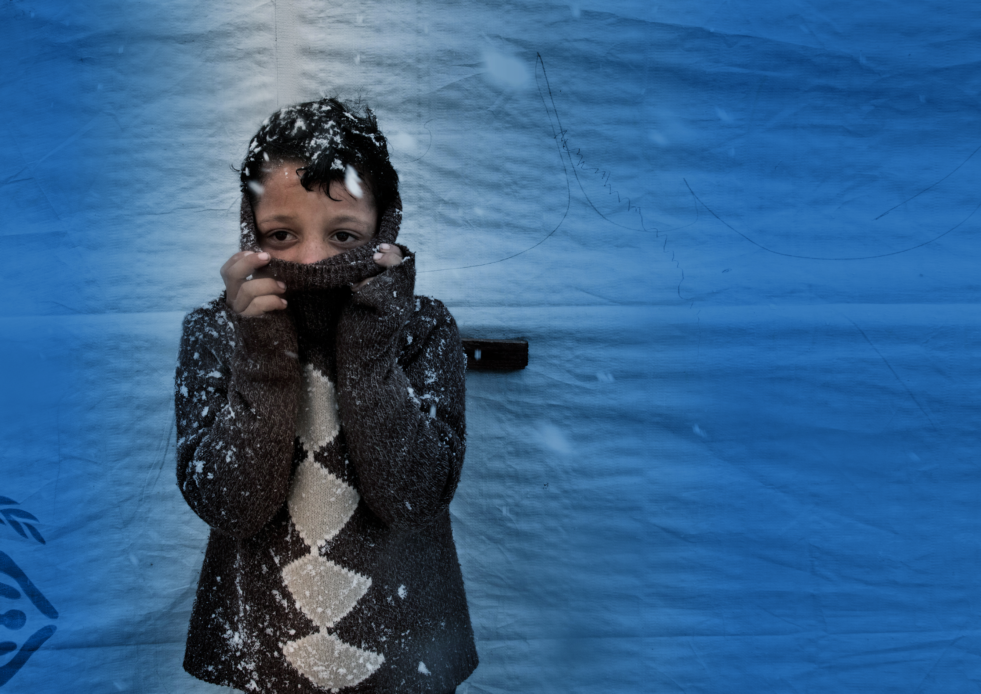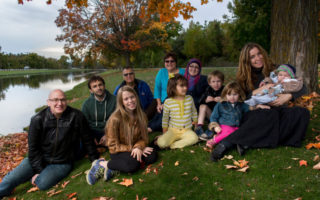
Tarek Al Haddad is a field associate who works closely with refugees in the Akkar district in Northern Lebanon. He has worked for UNHCR since 2012 and has seen first-hand the vulnerability of many refugee families when facing the freezing winter in the region. Here he shares with us his experience of working with refugees during the winter time and how valuable donor support can be for these families.
How cold does it get here in the winter and how hard does that make it for refugees?
First of all it really gets cold in Lebanon, especially in the mountain areas where the temperature goes below zero. Second of all, the majority of the Syrian refugee population is considered as vulnerable, and the majority of them are living in inadequate shelter conditions, living in either tents in informal settlements or in unfinished buildings. So in the winter-time they really suffer from the cold and struggle meeting their basic needs.
The winter season makes refugees even more vulnerable as they are subjected to different weather conditions which affects their health. Due to the shelter conditions that the refugees live in and the fact that the majority of them does not have the luxury of buying new clothes for winter to protect themselves from the cold, they are more at risk to develop different health issues
Can you tell me why winter cash assistance is so important for vulnerable families?
UNHCR and our partners provide cash assistance to refugees through the winter season so that refugees are able to meet their basic needs. Refugees use this assistance to buy fuel and to clothes to stay warm. They also try to use the money to strengthen the shelters where they live to prepare them for winter.
When receiving this assistance refugees are able to prioritize their needs and control what they want to spend their money on. They are best able to understand their own problem and respond to them. That’s how they can best address their specific vulnerabilities. They use this money to buy the things they need to survive the harsh winter season.
We should also remember that when we provide cash assistance to refugees we are in one way or another helping out the host community as well, that is one of the things that we should always take into consideration when we are discussing winter assistance. This helps the social cohesion between the two communities because the host community sees that the refugees are providing a positive impact.
Do you have a message to people who are thinking about donating to UNHCR?
Our message is that each penny counts, all the assistance, all the donations that are given to UNCHR count. So it doesn’t matter how big the donation is from donors, everything counts. All donations given to UNHCR are channeled to refugees and. The more funds we have the more we can do for refugees during the winter season.
How does it make you feel to be able to help Syrian refugee families during the winter?
It’s really amazing to see that refugees are staying warm, they are buying fuel. No refugees, no kids are cold at night.
We can see it in the faces of the refugees when they come to receive their cards, the ones that we use to provide the assistance. You can see that the refugees they are happy, at least for that moment when they receive the assistance. They are happy that they are going to buy the things they need to help them survive winter.
Refugees wait for the assistance from one winter to another, they see it as essential for them to survive especially because of health issues they experience in the winter time and the shelter conditions. So it is very important to them, especially at this time of year.
What message would you give to donors who have already donated to UNCHR and have helped pay for winter assistance?
First of all I would like to say thank you, on behalf of the refugees, because the assistance has been tremendously helpful during the winter. Your donations made a huge difference for refugees living here in Lebanon, for that thank you!



